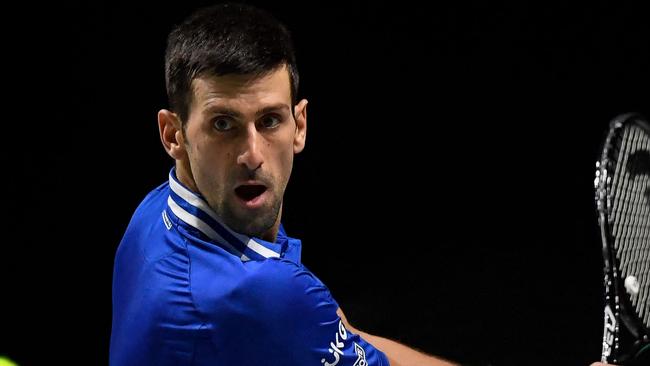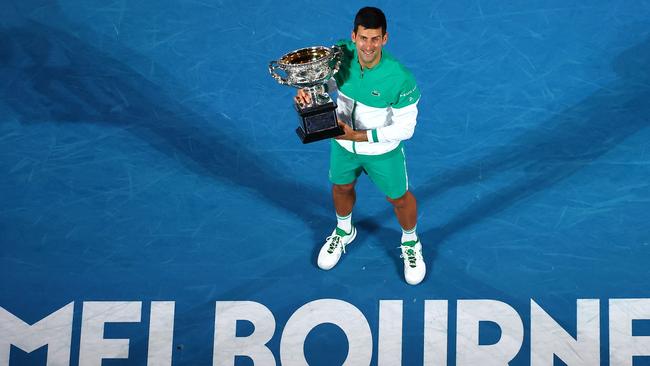If Novak Djokovic wants to be loved, he’s got a funny way of showing it

“I feel like I was blessed to experience love from the crowd and support from the stadium that I have never experienced before in my life in New York, and actually not in many places around the world,” Djokovic, 34, reflected in November.
“That kind of energy which I received from the crowd from the moment I stepped in the court until I stepped out is a win for life and for this human relationship, so to say. They just touched my heart.”
That is likely to be quite a contrast to the welcome he will receive in Melbourne when he walks out at Rod Laver Arena for his first-round match at the Australian Open in 12 or 13 days. A taste of what to expect came from the thousands of social media posts responding to the news yesterday (Tuesday) that Djokovic had received a medical exemption to compete. “We are seething with anger,” one Australian resident wrote, while the front page of one of the country’s newspapers ran the headline: “You must be Djoking.”
Happy New Year! Wishing you all health, love & joy in every moment & may you feel love & respect towards all beings on this wonderful planet.
— Novak Djokovic (@DjokerNole) January 4, 2022
I’ve spent fantastic quality time with loved ones over break & today I’m heading Down Under with an exemption permission. Let’s go 2022! pic.twitter.com/e688iSO2d4
For all the fury down under, it must be pointed out that Djokovic has satisfied two separate panels of doctors, in an anonymous application, that he meets the criteria for an exemption from a Covid-19 vaccine. We will perhaps never know why because of medical confidentiality, but it can be safely assumed that he has reasonable grounds given that the decision is ultimately made by independent experts appointed by the local government.
The manner, however, in which this long saga has played out has left a sour taste in the mouths of Australians who feel that a loophole is unfairly being exploited. After living under strict restrictions for much of the past 22 months - some grieving relatives were denied cross-border travel between states to attend funerals - it is understandable that members of the public feel that rules are being bent to allow an unvaccinated sporting superstar entry to the country.
There are raised eyebrows in the locker room at what is perceived by some to be special treatment. “It’s very interesting, that’s all I’m going to say,” Alex de Minaur, the Australian No 1, said yesterday (Tuesday). Entitled to feel particularly aggrieved is Natalia Vikhlyantseva, the Russian player who was denied entry because her Sputnik vaccine had not been approved, and the Indian junior Aman Dahiya, who cannot play because under-18s cannot yet receive jabs in his country.

No doubt Djokovic has been tone-deaf - not for the first time - in his approach to this issue in recent months. By allowing the uncertainty to drag out for so long, it has created a storm of controversy that he could do without. It remains baffling that one of the world’s greatest athletes, who has never hidden his desire for more affection, is not better advised on the public relations front.
Bear in mind that some unvaccinated players decided not to travel to Australia. Pierre-Hugues Herbert, a five-times grand-slam doubles champion from France, announced last month that the trip was “not an option” for him, while Tennys Sandgren, the world No 96 from the United States, removed his name from the entry list yesterday (Tuesday) and confirmed to the American tennis journalist Ben Rothenberg that he had not tried to apply for an exemption because he did not meet any of the criteria.
No wonder there was a triumphant tone to Djokovic’s post on social media yesterday (Tuesday). The Australian Open is his best grand-slam tournament and he has the chance to bid for a record-extending tenth title. The hard courts of Melbourne Park have always suited his impenetrable baseline game - he has not lost a match there since 2018 - and he tends to be in good physical shape at the start of a new season.
The decision to grant Djokovic an exemption could also have significant ramifications for the record books. A 21st grand-slam trophy would give him sole ownership of the all-time men’s singles record, moving him one ahead of Federer, absent because of his recovery from a third knee operation at the age of 40, and Nadal, who is only just returning to competitive action after a five-month break to treat a foot injury. Djokovic’s main contender this year is his US Open conqueror, Daniil Medvedev, the world No 2 from Russia.
This is not likely to be the last we hear of Djokovic and medical exemptions. It is almost certain that the Sunshine Swing of American tournaments in Indian Wells and Miami will require competitors to be fully vaccinated, and there are murmurs that similar arrangements will be in place for the French Open. There are no guarantees in those cases that dispensation will be granted.
The Times






When Novak Djokovic previously appeared at a grand-slam tournament four months ago, he broke down in tears at the adulation from the US Open crowd. It is well documented that the Serbian has never enjoyed as much global support as his great rivals Roger Federer and Rafael Nadal, so he was somewhat taken aback to receive a standing ovation from 23,000 New Yorkers in an expression of sympathy for his failed attempt to complete the calendar grand slam.